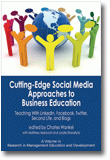
Cutting-edge Social Media Approaches to Business Education
Teaching with LinkedIn, Facebook, Twitter, Second Life, and Blogs
Edited by:
Charles Wankel, St. John's University, New York
A volume in the series: Research in Management Education and Development. Editor(s): Agata Stachowicz-Stanusch, Canadian University Dubai. Wolfgang Amann, HEC Paris. Hamid H. Kazeroony, North-West University Business School.
Published 2010
Our current students are digital natives, born into a world of widespread online sharing. Aligning the technologies we use in our courses with their skills and approaches to collaborative learning is an opportunity we should take. The new media share text, images, audio and video material rapidly and interactively. This volume will provide an overview of these new social media including Skype, YouTube, Flickr, blogging, LinkedIn, Facebook, and Twitter. Examples and cases of how instructors around the world are meaningfully incorporating them into their management, marketing, and other business courses are provided.
One of the more robust trends is the use of three-dimensional immersive virtual world interfaces for teaching and learning. The leading one is Second Life. Examples of the use of Second Life in business courses will be discussed. The use of wikis to foster collaborative development of course related material by learners will be presented with case examples.
Faculty members are co-creators of course content with their learners. Among the topics covered is how faculty members can be supported in their deployment of social media projects and course structures. How social media can enable the structuring of course activities involving students, prospective students, alumni, employers, businesspersons, and others in rich sharing and support with each other will be discussed. Indeed seeing courses as networking venues beyond learning forums will be parsed.
CONTENTS
Technologies That Bring Learners Collaboratively Together With the World, Charles Wankel. Defining Interactive Social Media in an Educational Context, Aditi Grover and David W. Stewart. Teaching and Learning With Skype, Alanah Mitchell, Charlie Chen, and B. Dawn Medlin. Social Media for the MBA Professor: A Strategy for Increasing Teacher-Student Communication and the Tactics for Implementation, Allen H. Kupetz. Applications of Social Networking in Students’ Life Cycle, Vladlena Benson, Fragkiskos Filippaios, and Stephanie Morgan. User-Generated Content in Business Education, Domen Bajde. Facebook “Friendship” as Educational Practice, Eva Ossiansson. Using Second Life for Teaching Management of Creativity and Innovation, Gary Coombs. Social Media Engages Online Entrepreneurship Students, Geoffrey R. Archer and Jo Axe. Intersection of Regulations, Faculty Development, and Social Media: Limitations of Social Media in For-Profit Online Classes, Hamid H. Kazeroony. Real Lessons in Virtual Worlds: Using Virtual World Technology to Educate and Train Business Students, Natalie T. Wood. Uses, Challenges, and Potential of Social Media in Higher Education: Evidence From a Case Study, Suling Zhang, Caroline Flammer, and Xiaolong Yang. The Use of Social Media and Networks in Teaching Public Administration: Perceptions, Practices, and Concerns, Thomas A. Bryer and Baiyun Chen. Social Media Strategies for the Academic Department: A Three-Phase Framework, Irvine Clarke III and Theresa B. Flaherty. Social Media Overload: What Works Best? Walkyria Goode and Guido Caicedo. Curriculum Redesign: Engaging Net Generation Students Through Integration of Social Media in Business Education, Jeanny Liu and Deborah Olson. About the Contributors.
-
Paperback978-1-61735-116-7
Web price: $45.04 (Reg. 52.99)
-
Hardcover978-1-61735-117-4
Web price: $80.74 (Reg. 94.99)
- eBook9781617351181

- COM060140 - COMPUTERS: Web: Social Networking
- BUS041000 - BUSINESS & ECONOMICS: Management
- BUS030000 - BUSINESS & ECONOMICS: Human Resources & Personnel Management
-
 Advancing African Knowledge Management and Education
Advancing African Knowledge Management and Education
-
 Anti-Corruption in Management Research and Business School Classrooms
Anti-Corruption in Management Research and Business School Classrooms
-
 Humanistic Values from Academic Community Perspective
Humanistic Values from Academic Community Perspective
-
 Management and Business Education in the Time of Artificial Intelligence
The Need to Rethink, Retrain, and Redesign
Management and Business Education in the Time of Artificial Intelligence
The Need to Rethink, Retrain, and Redesign
-
 Phronesis in Business Schools
Reflections on Teaching and Learning
Phronesis in Business Schools
Reflections on Teaching and Learning
-
 Principles of Responsible Management Education (PRME) in the Age of Artificial Intelligence (AI)
Opportunities, Threats, and the Way Forward
Principles of Responsible Management Education (PRME) in the Age of Artificial Intelligence (AI)
Opportunities, Threats, and the Way Forward
-
 The Ph.D. Mindset
Decoupling Passion from Research
The Ph.D. Mindset
Decoupling Passion from Research

